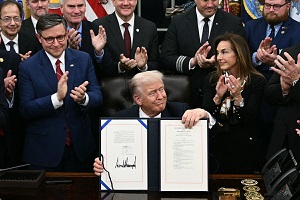How to measure climate progress - By Gernot Wagner, The Jordan Times
NEW YORK — Try putting yourself in Bill Gates’s shoes. You could spend your days on what made you one of the world’s richest people while also deploying your wealth to do the most good. You could invest in for-profit ventures pursuing things like clean-energy breakthroughs, or in effecting changes in policy. And to mark your 70th birthday, you could publish an essay that would quickly become a global news story.
Gates has done it all. His essay, “Three Tough Truths About Climate,” sent a shockwave through the climate movement on the eve of this year’s United Nations Climate Change Conference (COP30) in Belém, Brazil. But the essay is less blueprint than Rorschach test, because anyone can selectively quote from its 5,000 words to support a wide variety of viewpoints.
Like many such documents, this one begins with a strawman. In a move more typical of the Breakthrough Institute, a California-based group founded on the premise that environmentalism harms the climate cause, Gates rejects the “doomsday” argument that “nothing matters more than limiting the rise in temperature”. Little does – but Gates chose to go with “nothing”, a much stronger word.
He then argues that climate change, though a “serious” problem, “will not be the end of civilisation”. But supercharged storms and other climate-driven disasters are already upending lives and livelihoods. Of the five recorded storms severe enough to warrant the proposed “category 6” classification, all have happened in the past 15 years.
Moreover, we are not dealing only with massive, headline-grabbing extremes and global tipping points (irreversible planetary changes). There are also the pernicious, often hidden “slow burn” effects, like the 0.04 per cent loss in annual payroll for one additional day above 32°C in any given year. Such costs add up quickly. To point out that we can still live with average global warming below 3°C is hardly reassuring, especially for the poor and vulnerable who already suffer the most.
Gates’s reasoning on this socioeconomic dimension is understandable. His second and third tough truths focus on human suffering and prosperity, and these are indeed the criteria against which climate progress should be measured. Annual greenhouse-gas emissions, their atmospheric concentrations, the resulting warming, and effects like rising seas and more devastating storms are all ultimately proxies for lives that will be disrupted or even ended prematurely.
Climate change kills. Economists can now calculate the mortality cost of carbon. Each ton of CO2 emitted today kills around 0.0002 people. Again, such costs can add up quickly. The lifetime emissions generated by every 3.5 Americans today will kill one person by the end of the century.
True, many people already die from other preventable causes. Gates himself has called out US President Donald Trump’s administration for cutting aid funding in ways that will kill children in some of the poorest parts of the world. In an effort to make up for some of the shortfall with his own foundation and personal wealth, Gates has reduced his giving for climate programs and investments, both in the US and globally.
No one doubts that there are only so many philanthropic dollars to go around. But climate finance goes well beyond charity, as Gates shows by his own actions. His own total public health and climate funding have increased over time. “Funding,” in this case, includes support for Breakthrough Energy (which has no relation to the Institute), which has invested in more than 150 companies that need help scaling up climate technologies by driving down the “green premium” (the added costs of low-carbon technologies relative to high-carbon ones that pay nothing for their negative externalities).
Reducing this premium is necessary for many early-stage startups that have yet to climb the learning curve and benefit from economies of scale. Fortunately, there are plenty of other climate technologies that are already in the money. Solar power’s rapid growth over the past half-decade is the result of economics, not benevolence. The same goes for battery prices, which have fallen by about 50 per cent since 2010.
While other low-carbon technologies still command a green premium, most are trending towards profitability. Still, we need creative thinking to help them get there. Co-production helps. A company focused on a single product might lose against incumbents, but spreading the green premium across two or more products can cut costs significantly. The Gates-funded company Brimstone, for example, focuses both on producing lower-carbon cement and on making money from the alumina extracted in the production process. Sublime, a rival cement startup, is pursuing a similar strategy. (I recently co-authored a study with Brimstone’s CEO, Cody Finke, and a half-dozen colleagues, including an employee of another Gates-funded venture, on precisely this point.)
Patience helps, too. Back when Canadian Prime Minister Mark Carney was the governor of the Bank of England, he poignantly described the climate as a “tragedy of the horizon”. Too many businesses feel compelled to focus on short-term earnings, just as political leaders are unable to think beyond election cycles. But some of Gates’s climate investments, like those in the next-generation nuclear company TerraPower, and especially his investments in Commonwealth Fusion, are deliberately structured to yield returns years or even decades from now.
Supportive policies help, such as the explicit carbon prices and decarbonisation targets in the European Union, or the subsidies that are more prominent in the United States. The key, in each case, is to provide long-term investment certainty. This is an area where Gates’s essay is especially weak. While Gates fully recognises the importance of policy, he has created an opening for those, like Trump, who put their personal, short-term gain first.
But make no mistake: the benefits of shifting away from fossil fuels far outweigh the costs. Gates clearly understands that. Clean energy is about sovereignty, energy security, equity, and, yes, future competitiveness. Ending reliance on oil, coal, and gas, and embracing technologies that will only become better and cheaper over time, is not just smart climate policy. It is the best way to improve economic competitiveness and human prosperity for decades to come.
Gernot Wagner is a climate economist at Columbia Business School.




